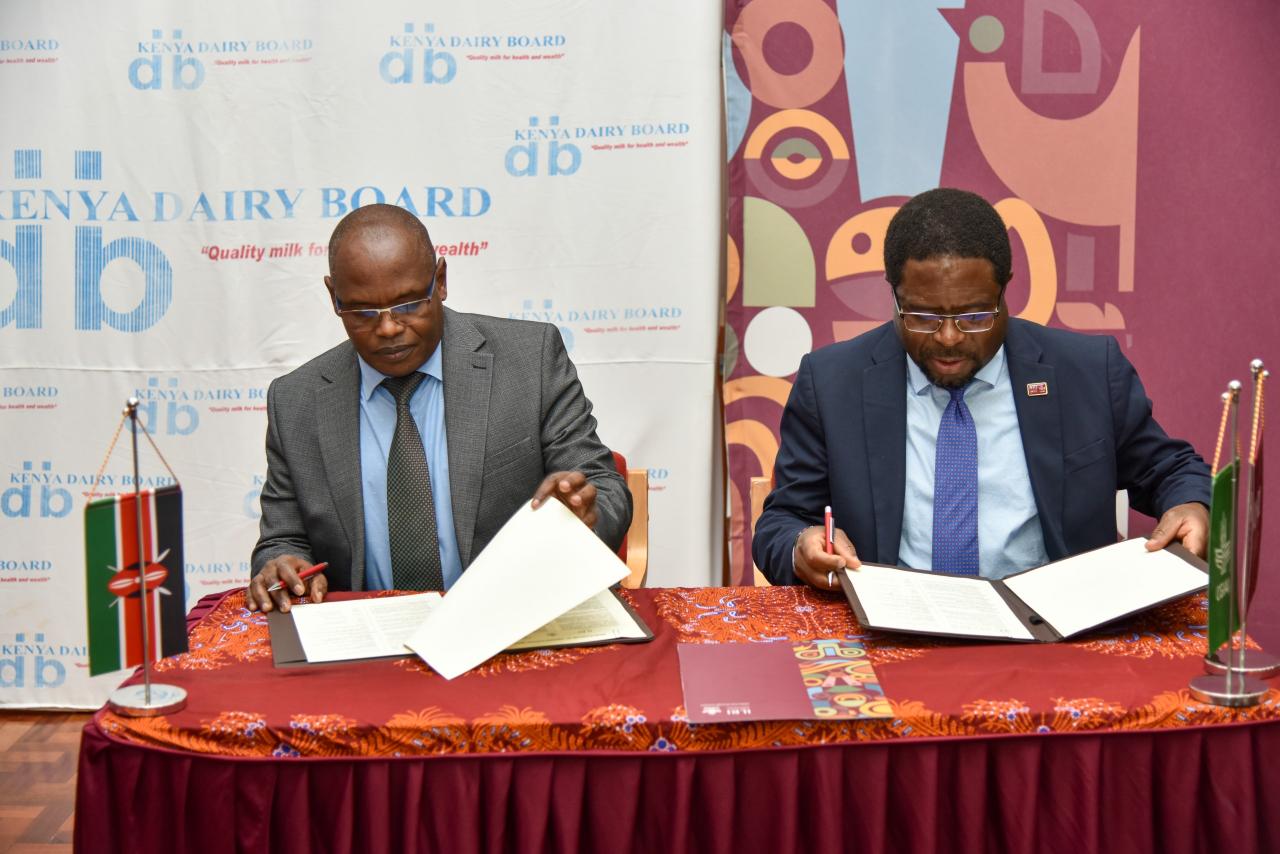
ILRI Director General, Appolinaire Djikeng and KDB Acting Managing Director, Dr. Kimutai Maritim sign a Memorandum of Understanding (MoU) to improve milk safety and production/ILRI.
The Kenya Dairy Board (KDB) and the International Livestock Research Institute (ILRI) have signed a Memorandum of Understanding to drive innovation, strengthen value chains and ensure safer, more sustainable milk production from “farm to glass.”
ILRI director general Appolinaire Djikeng said the partnership will provide a framework for collaboration “from farm to glass,” bringing together ILRI’s cutting-edge research and KDB’s regulatory leadership to improve dairy production, processing and consumer awareness.
“It is expected to unlock new opportunities for smallholder farmers, processors, and consumers while addressing food safety and nutrition gaps,” he said.
Djikeng said the partnership is designed to bridge critical gaps across both the formal and informal dairy chains.
He noted that the collaboration would improve milk safety and quality standards, scale innovations that enhance productivity and support resilience among smallholder farmers.
“We are looking at innovations and technologies that ensure animal health, improve genetics for climate-resilient production systems, and address challenges such as heat stress and disease. Capacity building is also key, not just within our institutions but across the sector to empower farmers and other stakeholders to contribute more effectively,” Djikeng said, adding that the ultimate goal is to increase farmer incomes while ensuring environmental sustainability.
KDB acting managing director, Dr Kimutai Maritim, said the collaboration aligns with Kenya’s ambitious plan to double milk consumption by 2030.
“The MoreMilk 2 project is a great example of how ILRI and KDB can work together. It supports livelihoods and nutrition while helping us meet our mandate to regulate, promote and develop the dairy industry with innovation and integrity,” he said.
Maritim explained that MoreMilk 2, which is now being upscaled, builds on the success of an initial pilot project in Eldoret’s informal settlements. The new phase will be implemented in Nakuru, Uasin Gishu and Nyandarua counties, with the aim of transforming informal milk trade into formal systems.
“More than half of Kenya’s milk passes through informal markets. While this supports many livelihoods, it poses challenges for quality control and food safety. By gradually formalising the sector, we expect more milk to reach markets safely, improving value, safety and consumer confidence,” he said.
Kenya’s dairy sector, the largest in East Africa, produces 5.33 billion litres annually, contributing about 4.5 per cent to GDP and over 12 per cent to agricultural GDP.
With per capita milk consumption at 92 litres and demand projected to rise, production must expand to meet the National Dairy Master Plan target of 18 billion litres annually.
Data from KDB shows that currently, over 50 per cent of milk is distributed through informal systems, providing affordable access for many households while creating jobs for youth and women.
The formal sector, though smaller, is more structured, involving cooperatives, processors and retailers. The new partnership is expected to bridge this divide, ensuring safer, more nutritious milk for all Kenyans.
“This MoU builds on previous collaboration between KDB and ILRI, particularly in food safety, and reflects a shared commitment to transforming the dairy sector into a more sustainable, inclusive, and innovation-driven industry,” Maritim said.















